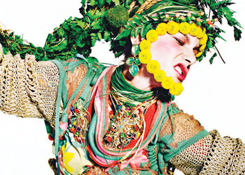
Ethical fashion is about pursuing a socially and environmentally-responsible approach in sourcing, designing, manufacturing and marketing clothing
WHILE THE POPULARITY of futuristic functional clothing is likely to be driven by its self-cleaning and self-warming/ cooling properties, or making electronics wearable, its eco-friendly potential in reducing consumption of resources in production and maintenance or charging gadgets would be a cross-cutting collateral advantage in most cases.
These are not isolated experiments by random researchers. The textile ecosystem itself is slowly imbibing such changes in its approach gradually. Biodegradable, eco-friendly, and skinfriendly fabrics will be the focus of global textile market in the future, according to a recently released report by Transparency Market Research, a global research consultancy. “High demand for biodegradable, environment-friendly, versatile, and cost-effective materials from end-use industries is a key factor that stimulates demand from the global cellulose fibres market.” It’s noteworthy that clothing accounts for more than 50 per cent of the global cellulose fibres end-use market.
As the eco-fashion industry grows, so does its segmentation into various generic labels. An overarching term, ethical fashion, is about pursuing a socially and environmentallyresponsible approach in sourcing, designing, manufacturing and marketing clothing. Understandably, the sourcing is done from poorer developing countries and the consumption is in affluent developed countries.
While eco-fashion focuses on the use of environment-friendly materials and production, its most popular segment of organic clothes are made from materials such as cotton or jute, which are grown without the inputs of chemical fertilisers, insecticides or geneticallymodified seeds. In all cases, a complete organic lifecycle approach may not be always followed. Some manufacturers are still using chemicals -- from dyeing to bleaching process. Although it could be due to constraints such as availability, costs, or simply expediency, yet it’s only a matter of time before the entire lifecycle becomes organic.
In contrast, Fair Trade involves payment of fair prices through the supply chain as well as compliance with social standards. One of the popular interventions, the Ethical Fashion Initiative, which is a flagship programme of the International Trade Centre, a joint agency of the United Nations Conference on Trade and Development (UNCTAD) and World Trade Organisation, seeks to connect poor artisans with international fashion chains. Fair Trade is driven by conscious consumers in affluent societies willing to pay fair compensation to players in the value chain, including primarily poor farmers.
India is an important stakeholder in this emerging eco-friendly and fair trade world apparel order. The recently-held Lakmé Fashion Week renamed its usual “The Indian Handloom & Textile Day” as the “Sustainable and Indian Textile Day” to be a flag bearer of eco-fashion in the country, covering key values of sustainability holistically, according to the organisers. Throughout the Lakmé Fashion Week, designers were invited to showcase sustainable and eco-friendly designs. Some designers chose themes linked to climate change and sustainable development. Such fashion events may be one-off events for the select few, but their visibility fuels mass awareness on the back of celebrity endorsement.
Glitter to the eco-fashion industry is being added by senior as well as young fashion designers. Many designers such as Anupama Dayal and Anaka Narayananan are known for using natural fabrics as well as dyes.
Waste reduction is the focus of most designers. While Siddhartha Upadhyaya uses technology to reduce waste generation, Karishma Shahani recycles and reuses fabric scraps and discarded clothing. Similarly, Shalabh and Anita Ahuja refashion waste into lifestyle products, and Ruchika Sachdeva and Swati Argade focus on recycling, repurposing and upcycling.
In an innovative initiative, Sheena Matheiken’s Uniform Project focused on a minimalistic approach, experimenting with a Little Black Dress, styling it differently each day through the whole year. The experiment succeeded in emphasising how to do more with less — and still be fashionable. Designers have been both setting trends as well as taking cues.
In fact, a few years ago, leading brands such as Wills Lifestyle, Van Heusen and Arrow launched their organic lines made of cotton and linen in natural dyes, using natural fibres and avoiding the use of chemicals. They may have met with modest success, but they opened up new opportunities in the country.
Today, one of the popular extreme weather outdoor gear and outerwear brands, Woodland, is well-known for using eco-friendly and recyclable materials in some of its lines. Its biodegradable footwear range has already caused a stir in the eco-fashion industry. It is little wonder then that Woodland’s Corporate Social Responsibility (CRS) initiative Proplanet is dedicated to the cause of the environment.
Unlike others, organic clothing brand Bhu:sattva started green instead of going green, integrating ethics and sustainability in the DNA of its supply chain from day one. Avoiding fast fashion, Bhu:sattva’s mainstay are organic cotton and natural dyes. Besides organic cotton, Bhu:sattva also uses organic silk, including tussar and ahimsa, or cruelty-free silk. Natural silks such as ghichha, nassi, eri-muga than, mulberry, kora, desi tussar, baftak kosa and tussar-muga are also used in its products. In addition, Bhu:sattva makes a conscious attempt to root contemporary trends in traditional crafts, thereby contributing to sustainability of our rich heritage and society as well.
Ethicus is a social enterprises focusing on inclusive growth and ethical business practices through its entire value chain. Its Appachi Eco-logic Project seeks to promote cultivation of organic cotton supported by education of farmers in traditional as well as modern techniques.
Though the list of such progressive enterprises is long, yet it falls short in a country of the size and challenges of India. It’s finally up to the consumers to catalyse the movement of ethical fashion in the country and make it mainstream.
